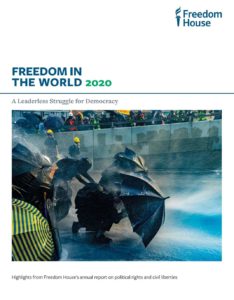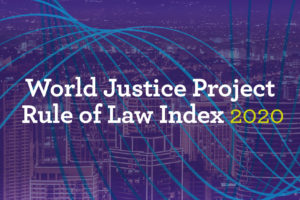A former close ally of Turkish President Tayyip Erdogan applied on Monday to register a new political party to challenge his ruling AK Party, saying Turkey needed a “fresh start” and calling for reforms to strengthen the rule of law and democracy, Reuters reports.
 Over the past year, the latest Freedom in the World survey notes that “electoral integrity, judicial independence, and safeguards against corruption” have been undermined, and democratic norms violated through “fierce rhetorical attacks on the press, the rule of law, and other pillars of democracy,” Council on Foreign Relations analyst Stewart Patrick writes for World Politics Review.
Over the past year, the latest Freedom in the World survey notes that “electoral integrity, judicial independence, and safeguards against corruption” have been undermined, and democratic norms violated through “fierce rhetorical attacks on the press, the rule of law, and other pillars of democracy,” Council on Foreign Relations analyst Stewart Patrick writes for World Politics Review.
Rule of law means that we are ruled by reason and intelligence, not power and ambition, Ralph Strate writes for The Times of Israel. Codified law means that we follow a code that has been worked out in advance, that we are not governed by personal passions and whims. Equality before the law means that we conduct ourselves according to moral and ethical principles, not according to someone’s arbitrary exercise of authority.
Troubling developments around the rule of law continue to raise concerns for the future of fair and functioning societies, the World Justice Project reports. Since 2009, it has documented these trends in its annual WJP Rule of Law Index, now covering 128 countries and jurisdictions. Based on more than 130,000 household surveys and 4,000 legal practitioner and expert surveys worldwide, the 2020 Index provides citizens, governments, donors, businesses, and civil society organizations around the world with a comprehensive comparative analysis of countries’ adherence to universal rule of law principles.
 Join USIP and the World Justice Project to delve into the latest findings from the WJP Rule of Law Index 2020 at the United States Institute of Peace (USIP) on Wednesday, March 11, 2020 from 2:00 PM to 3:30 PM. Please register for the event here.
Join USIP and the World Justice Project to delve into the latest findings from the WJP Rule of Law Index 2020 at the United States Institute of Peace (USIP) on Wednesday, March 11, 2020 from 2:00 PM to 3:30 PM. Please register for the event here.
“Global Trends in the Rule of Law.”
Speakers: William Hubbard, chairman of the board of directors of the World Justice Project; Sanjay Pradhan, CEO of the Open Government Partnership; Alejandro Ponce, chief research officer, World Justice Project; Elizabeth Andersen, executive director of the World Justice Project; Margaret Lewis, professor of law at Seton Hall University; Maria Stephan, director of nonviolent action, USIP; David Yang, USIP vice president for applied conflict transformation; and Philippe Leroux-Martin, director for governance, justice and security at USIP
Venue: USIP, 2301 Constitution Avenue NW, Washington, D.C. RSVP: Paul Johnson, 202-429-7174, pjohnson@usip.org
At a recent NED presentation (below), Professor Martin Krygier critiqued existing ways of thinking about the rule of law, offered alternative frameworks and explored how adapting our intellectual approach might improve the global community’s ability both to promote the rule of law and to defend it against the global efflorescence of populist and authoritarian enemies.







